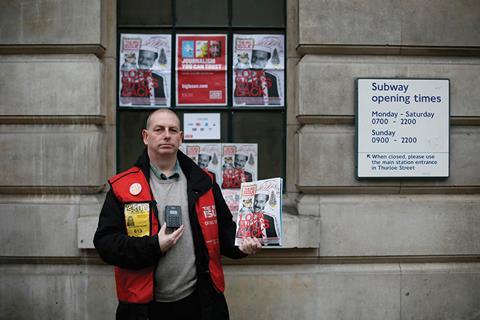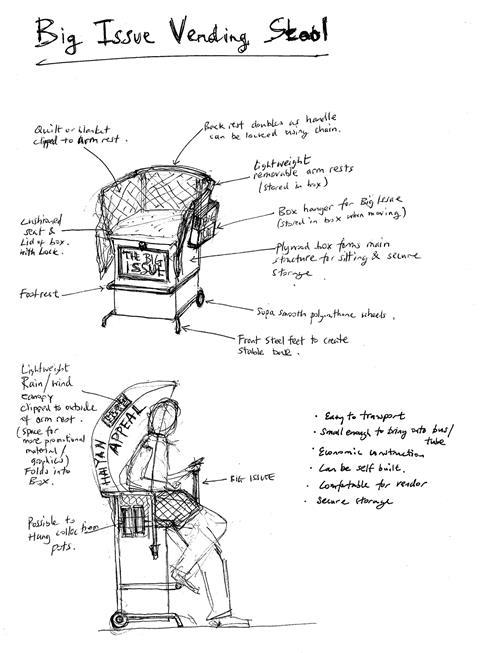Shopping centres allowing the Big Issue to be sold inside would be “game changing” for the charity. But the mall owners are a tough nut to crack, as David Hatcher discovers. Photograph by Stefan Wermuth

Simon Mott (pictured) cannot understand why he and his fellow Big Issue vendors are not allowed to sell their magazines inside shopping centres
Who are these heartless people who own shopping centres? Why don’t they just say: ‘Come inside here mate, where it’s a bit warmer’ when it’s raining or snowing? What’s the big deal? It’s just a shopping street under cover.”
Simon Mott (pictured) cannot understand why he and his fellow Big Issue vendors are not allowed to sell their magazines inside shopping centres.
As Stephen Robertson, chief executive of the Big Issue Foundation points out: “Selling newspapers in the rain is not much fun. They don’t last long and it’s hard work.”
If shopping centre owners were to allow vendors to operate inside the entrances of their centres, it would be “game changing” for the Big Issue, says Robertson. He is desperate for the “traditional resistance” that he has faced from centre owners to abate.
The Big Issue is running a competition to design a shop or pop-up stand from which vendors can operate. Entries close in two weeks and judging — in which architect George Clarke, who fronts Channel 4 show George Clarke’s Amazing Spaces, is involved — will be completed by the end of next month.

Robertson’s goal is to have 50 vendors operating from shopping centres across the country in the next two years, predominantly from these stands. He hopes the sales points will be welcomed by shopping centres, as they will provide a sense of professionalism and coherency.
Prompted by his emotive call at last September’s RESI 2013 conference for more assistance for vendors, Property Week two months ago approached five of the UK’s largest shopping centre owners — British Land, Hammerson, Intu Properties, Land Securities and Westfield — about allowing Big Issue vendors into their shopping centres, and put them in touch with Robertson.
Such a simple change has the potential to dramatically improve the fortunes of people that are homeless. With that in mind, Property Week spoke to owners, vendors and those that have set up similar initiatives in other sectors to see how such a scheme could work and why some landlords are reluctant to change.
A few have been receptive and are open to the possibility of making progress. Others did not contact Robertson, reasoning that, as they support other charities, they cannot have Big Issue vendors in their centres.
“No one is vocal enough to actually say that they think a vendor would be unsightly or disruptive, but there is a common misapprehension with people that are homeless in general that people think it would be better if they just weren’t there,” says Robertson. “But actually, these are hard-working business people.”
Vendors, who have no permanent accommodation, buy the Big Issue for half of its £2.50 cover price. The process is designed to instil the concept of saving into vendors, as they have to use some of their proceeds to buy new magazines.
They sell the magazine from a designated pitch and must abide by the Big Issue’s extensive code of conduct, or they will not be sold any more copies and will lose their livelihood. The code includes not being under the influence of any substances, not obstructing the public, and clearly displaying Big Issue identification and uniform at all times.
Were Big Issue vendors taken on by centre owners, they would be experienced salespeople that would be hand-picked by the foundation and the shopping centre concerned to ensure that all parties were comfortable with the idea.
This has been the case when other corporate entities — among them law firms — have taken on vendors to sell the magazine on their premises. They include Cadbury’s, Freshfields Bruckhaus Deringer and Simmons & Simmons (box, below).
“We’d be happy to talk about any issue regarding specific concerns,” says Robertson. “It wouldn’t be a wide interview process [for vendors], as we would be looking for people who were ‘further down their journey’. It would be an opportunity for more established vendors that are well known to us and are ready for the next stage.”
Out in the cold
Shopping centres are doubly frustrating for vendors. Not only are they unable to benefit from the malls’ high footfall, and warm and dry environment, but shoppers are often sucked into centres and away from the streets on which vendors are based.
“Shoppers go straight in there, stay for a while and then go straight back out again,” adds Robertson. “It’s a barrier, and business we can’t mop up from the outside that easily from where the footfall has been displaced. In those instances, we’ve got a particular desire to get vendors into the centres.”

In the two months since British Land, Intu, Hammerson, Land Securities and Westfield were contacted, only Hammerson has met Robertson to discuss his ideas.
“We had a positive meeting with the Big Issue to understand more about its business and aspirations for working with landlords,” says Peter Cooper, Hammerson retail portfolio director.
“We are undertaking a much wider piece of work on the experience within our shopping centres over the first half of this year, looking at customer experience, how the centres become wider hubs within their communities and how we engage with local organisations and national charities.”
Intu also made contact with Robertson and is open to the idea of finding a way for Big Issue vendors to operate within its centres.
Its operations director, Gordon McKinnon, says: “Intu, as with most major landlords, has had a policy of not allowing Big Issue sellers to operate from our centres, as the Big Issue operating model didn’t fit within our promise to our customers. We are, however, open to discussing with the Big Issue the ideas it has for alternative ways of selling the Big Issue, and a date is in the diary to do just that.”
Conflict of interests
British Land, Land Securities and Westfield, on the other hand, made no contact with the Big Issue about discussing its ideas for the sale of the magazine in their centres. The trio unquestionably support other charities, but in doing so, each said this would preclude Big Issue vendors from selling within their centres or that it would not be possible to have a central policy on the matter.
A spokeswoman for Westfield says: “We receive a large number of requests from charities to partner with them and unfortunately we can’t say yes to them all. In terms of charity support in the UK, Westfield focuses specifically on the theme of children’s health and education, and has established a long-term partnership with Save the Children. To ensure we can maximise our support, both financial and brand presence, there is currently no scope to work with other charities, including the Big Issue, on an ongoing basis.”
Similarly, a spokeswoman for British Land says: “We aim to support a wide range of charities and our experience shows that charities have the most success when they are the only one at a centre on any given date.”
British Land does not have a policy “that allows or disallows Big Issue salespeople in our shopping centres” and “all charitable organisations are welcome to apply for pitches at our centres”.
Land Securities also says that it does not have “a central policy on individual charities, other than one national charity partner”.
A spokeswoman says: “Therefore, we wouldn’t consider it appropriate to make an exception to do this for the Big Issue or any other cause”.
A Big Issue salesperson wanting to set up pitch in a Land Securities mall would have to contact the particular centre’s management. “Our local centres decide on an individual basis which local charities or causes to support,” she adds.
The company says it does “have Big Issue sellers operating at a small number of our centres”, naming Lewisham Shopping Centre in south-east London. However, when Property Week contacted Lewisham’s management about buying a Big Issue, it was told that vendors operate only outside the front of the centre.
Despite these barriers, Robertson is hopeful that if landlords such as Hammerson and Intu find room for one of the new pop-ups, the idea will soon spread among other owners.
“It will just take someone who gets it and is in the right position and with the right connections and influence to create the opportunity to make it happen,” he says. “It takes only one owner to do it and see that it works, and then hopefully it will catch on.”
Owners of shopping centres in the UK have the opportunity to make a tangible, positive impact on the livelihoods of homeless people that sell the Big Issue. In the meantime, vendors will sell out in the cold, waiting for that first landlord to make a commitment.
Company schemes provide blueprint
For more than three years Freshfields Bruckhaus Deringer has taken on a vendor to sell the Big Issue one day a week at its Fleet Street office. The vendors are given six-month placements. Six have so far taken on the role.
Fellow law firm Simmons & Simmons, and Cadbury’s operate similar initiatives. These schemes could be replicated by shopping centre owners. The Big Issue would help to source appropriate vendors.
“We sat down with the Big Issue and we were looking for someone who had worked quite hard to make an impression on them and wanted to make the next step,” says Juliet Holden, Freshfields Bruckhaus Deringer’s corporate responsibility executive.
“I knew one of the vendors we took on — they worked outside Blackfriars Tube station. But we work together with the Big Issue, as it is the expert on its vendors and knows who would be the right fit.”

As a result of the office placements, the vendors’ operations are much more profitable. The initiative has also improved engagement between the company’s staff and clients, and Big Issue sellers. The law firm also provides the vendors with work experience at quieter times of the day to help them build their skills.
“We give them training in a variety of different areas across our departments including IT, human resources, the staff restaurant and reprographics,” says Holden. “We put in place a mentoring scheme, so they have someone to help put a plan of action together. It has been very successful and our first vendor now has a role in our billing department.”
Allowing vendors inside shopping centres, operating in a similar way to the highly professional environment of Freshfields’ office, is something that Holden believes would enhance a shopping centre.
“If there was a similar scheme in a shopping centre, they wouldn’t be dealing with a new vendor every week,” she adds. “It is almost like you sponsor a vendor, and I think it would be rewarding for owners and for their customers.”
Shopping centres need educating
Simon Mott (pictured), 49, sells the Big Issue outside South Kensington Tube station. A former London Underground driver, he was left without a job three years after an accident in which the Tube he was driving crashed into a tree.

Once a week he volunteers at lesbian, gay and bisexual charity Stonewall. Another day each week, he sells the magazine at law firm Simmons & Simmons, where he also benefits from work experience across several departments, among them finance and the post room. He has set up a card reader system so that he can take payments from customers who do not have cash, and is the process of setting up an eBay shop.
Mott is perhaps not what is considered to be the “average” Big Issue salesperson, but is an example of the type of vendor that shopping centre landlords could have operating in their malls.
He baulks at the attitude of prohibitive owners that do not allow vendors inside their centres.
“[The pop-up stands] should give it a more professional image and vendors would obviously be handpicked,” he says. “We’re not all hanging around a cash machine with a dog on a string.”
The attitude of landlords needs to change, asserts Mott, who says they need to gain a greater understanding of how the Big Issue operates.
“There is probably some stereotyping and prejudice among those shopping centres that don’t understand what the Big Issue does and what it’s about,” he adds. “They need to be educated.
“It’s not clashing with anyone’s business. It’s something new. It’s not like selling burgers outside McDonald’s or shirts outside Next. People are charitable and they do like to give money as long as there is the right vendor. And there is no reason why that can’t be done.”
The local knowledge that vendors bring would also be an asset to shopping centres, believes Mott, who says he frequently gives out nuggets of information to tourists to help them on their way.
“I give tourists lots of information, from what is on in the area, where is the best place to eat and where the nearest cash machine is, through to where the Queen lives and how many pence there are in the pound. We could always tell people where different shops were, the best place to get things from and where there’s a sale on,” he adds.
A hand-up, not a handout
When I contacted five of the UK’s largest shopping centre owners — British Land, Hammerson, Intu, Land Securities and Westfield — more than two months ago to tell them about the ambition of the Big Issue Foundation’s chief executive, Stephen Robertson, to get vendors into shopping centres, I was hopeful of a positive reception.

It is a matter that would be “game changing”, as Robertson describes it, and these companies operate in a sector that frequently makes bold statements of charity. Whether it is someone sticking their hand up for an exorbitant lot in a charity auction after a few glasses of bubbly or climbing Mount Kilimanjaro, the property industry is undoubtedly generous. This request was simpler, utilising the resources that companies already have.
Generally, I found their reactions to be disappointing. Hats off to Hammerson for being the only company to meet Robertson and for Intu for getting something set up. Let’s hope that tangible progress is made.
The responses of British Land, Land Securities and Westfield are saddening. Helping other charities — which they undoubtedly do — does not exclude the possibility of having vendors or vendor pop-ups within centres, and suggesting as such is wrong. What the Big Issue is looking for is “a hand-up, not a handout”.
If it is OK for upmarket law firms and their clients, why not for landlords and their shoppers?
If you are a tenant or landlord of a shopping centre or any other building, and would like to consider having a vendor operating from your property, the Big Issue and Property Week want to hear from you, so that we can cover the progress made.
David Hatcher is Property Week’s finance editor
The Big Issue competition
A selection of the entries so far…






































No comments yet